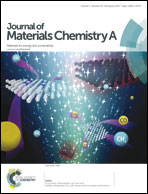Tailoring interactions of carbon and sulfur in Li–S battery cathodes: significant effects of carbon–heteroatom bonds†
Abstract
In this study, effects of carbon–heteroatom bonds on sulfur cathodes were investigated. A series of carbon black substrates were prepared using various treatments to introduce nitrogen or oxygen surface species. Our results indicated that nitrogen-doped carbon black significantly improved the electrochemical performance of sulfur cathode materials. Synchrotron-based XPS revealed that the defect sites of nitrogen-doped carbon are favorable for the discharge product deposition, leading to a high utilization and reversibility of sulfur cathodes. Our studies also found that the introduction of oxygen functional groups results in deteriorated performance of Li–sulfur batteries due to the reduced conductivity and unwanted side reactions occurring between sulfur and surface oxygen species.


 Please wait while we load your content...
Please wait while we load your content...